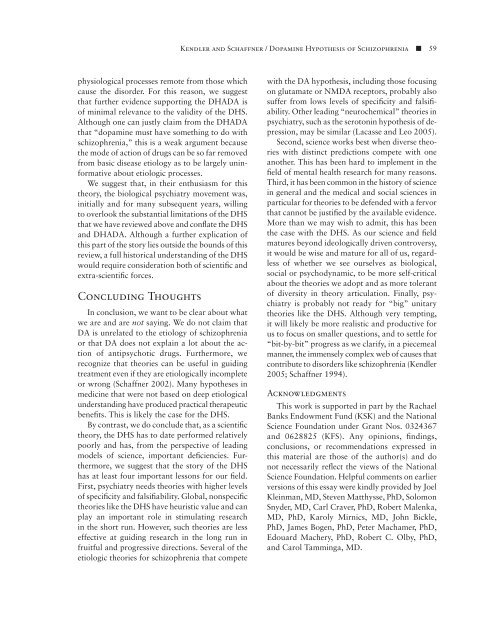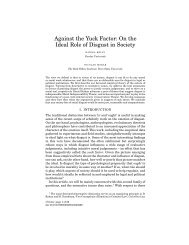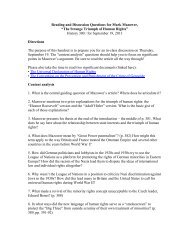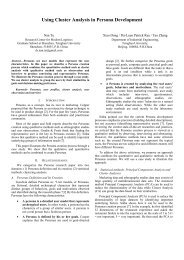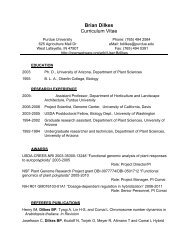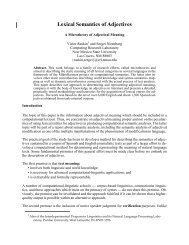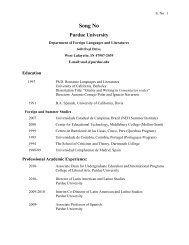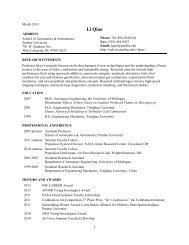The Dopamine Hypothesis of Schizophrenia: An Historical and ...
The Dopamine Hypothesis of Schizophrenia: An Historical and ...
The Dopamine Hypothesis of Schizophrenia: An Historical and ...
You also want an ePaper? Increase the reach of your titles
YUMPU automatically turns print PDFs into web optimized ePapers that Google loves.
Kendler <strong>and</strong> Schaffner / <strong>Dopamine</strong> <strong>Hypothesis</strong> <strong>of</strong> <strong>Schizophrenia</strong> ■ 59<br />
physiological processes remote from those which<br />
cause the disorder. For this reason, we suggest<br />
that further evidence supporting the DHADA is<br />
<strong>of</strong> minimal relevance to the validity <strong>of</strong> the DHS.<br />
Although one can justly claim from the DHADA<br />
that “dopamine must have something to do with<br />
schizophrenia,” this is a weak argument because<br />
the mode <strong>of</strong> action <strong>of</strong> drugs can be so far removed<br />
from basic disease etiology as to be largely uninformative<br />
about etiologic processes.<br />
We suggest that, in their enthusiasm for this<br />
theory, the biological psychiatry movement was,<br />
initially <strong>and</strong> for many subsequent years, willing<br />
to overlook the substantial limitations <strong>of</strong> the DHS<br />
that we have reviewed above <strong>and</strong> conflate the DHS<br />
<strong>and</strong> DHADA. Although a further explication <strong>of</strong><br />
this part <strong>of</strong> the story lies outside the bounds <strong>of</strong> this<br />
review, a full historical underst<strong>and</strong>ing <strong>of</strong> the DHS<br />
would require consideration both <strong>of</strong> scientific <strong>and</strong><br />
extra-scientific forces.<br />
Concluding Thoughts<br />
In conclusion, we want to be clear about what<br />
we are <strong>and</strong> are not saying. We do not claim that<br />
DA is unrelated to the etiology <strong>of</strong> schizophrenia<br />
or that DA does not explain a lot about the action<br />
<strong>of</strong> antipsychotic drugs. Furthermore, we<br />
recognize that theories can be useful in guiding<br />
treatment even if they are etiologically incomplete<br />
or wrong (Schaffner 2002). Many hypotheses in<br />
medicine that were not based on deep etiological<br />
underst<strong>and</strong>ing have produced practical therapeutic<br />
benefits. This is likely the case for the DHS.<br />
By contrast, we do conclude that, as a scientific<br />
theory, the DHS has to date performed relatively<br />
poorly <strong>and</strong> has, from the perspective <strong>of</strong> leading<br />
models <strong>of</strong> science, important deficiencies. Furthermore,<br />
we suggest that the story <strong>of</strong> the DHS<br />
has at least four important lessons for our field.<br />
First, psychiatry needs theories with higher levels<br />
<strong>of</strong> specificity <strong>and</strong> falsifiability. Global, nonspecific<br />
theories like the DHS have heuristic value <strong>and</strong> can<br />
play an important role in stimulating research<br />
in the short run. However, such theories are less<br />
effective at guiding research in the long run in<br />
fruitful <strong>and</strong> progressive directions. Several <strong>of</strong> the<br />
etiologic theories for schizophrenia that compete<br />
with the DA hypothesis, including those focusing<br />
on glutamate or NMDA receptors, probably also<br />
suffer from lows levels <strong>of</strong> specificity <strong>and</strong> falsifiability.<br />
Other leading “neurochemical” theories in<br />
psychiatry, such as the serotonin hypothesis <strong>of</strong> depression,<br />
may be similar (Lacasse <strong>and</strong> Leo 2005).<br />
Second, science works best when diverse theories<br />
with distinct predictions compete with one<br />
another. This has been hard to implement in the<br />
field <strong>of</strong> mental health research for many reasons.<br />
Third, it has been common in the history <strong>of</strong> science<br />
in general <strong>and</strong> the medical <strong>and</strong> social sciences in<br />
particular for theories to be defended with a fervor<br />
that cannot be justified by the available evidence.<br />
More than we may wish to admit, this has been<br />
the case with the DHS. As our science <strong>and</strong> field<br />
matures beyond ideologically driven controversy,<br />
it would be wise <strong>and</strong> mature for all <strong>of</strong> us, regardless<br />
<strong>of</strong> whether we see ourselves as biological,<br />
social or psychodynamic, to be more self-critical<br />
about the theories we adopt <strong>and</strong> as more tolerant<br />
<strong>of</strong> diversity in theory articulation. Finally, psychiatry<br />
is probably not ready for “big” unitary<br />
theories like the DHS. Although very tempting,<br />
it will likely be more realistic <strong>and</strong> productive for<br />
us to focus on smaller questions, <strong>and</strong> to settle for<br />
“bit-by-bit” progress as we clarify, in a piecemeal<br />
manner, the immensely complex web <strong>of</strong> causes that<br />
contribute to disorders like schizophrenia (Kendler<br />
2005; Schaffner 1994).<br />
Acknowledgments<br />
This work is supported in part by the Rachael<br />
Banks Endowment Fund (KSK) <strong>and</strong> the National<br />
Science Foundation under Grant Nos. 0324367<br />
<strong>and</strong> 0628825 (KFS). <strong>An</strong>y opinions, findings,<br />
conclusions, or recommendations expressed in<br />
this material are those <strong>of</strong> the author(s) <strong>and</strong> do<br />
not necessarily reflect the views <strong>of</strong> the National<br />
Science Foundation. Helpful comments on earlier<br />
versions <strong>of</strong> this essay were kindly provided by Joel<br />
Kleinman, MD, Steven Matthysse, PhD, Solomon<br />
Snyder, MD, Carl Craver, PhD, Robert Malenka,<br />
MD, PhD, Karoly Mirnics, MD, John Bickle,<br />
PhD, James Bogen, PhD, Peter Machamer, PhD,<br />
Edouard Machery, PhD, Robert C. Olby, PhD,<br />
<strong>and</strong> Carol Tamminga, MD.


